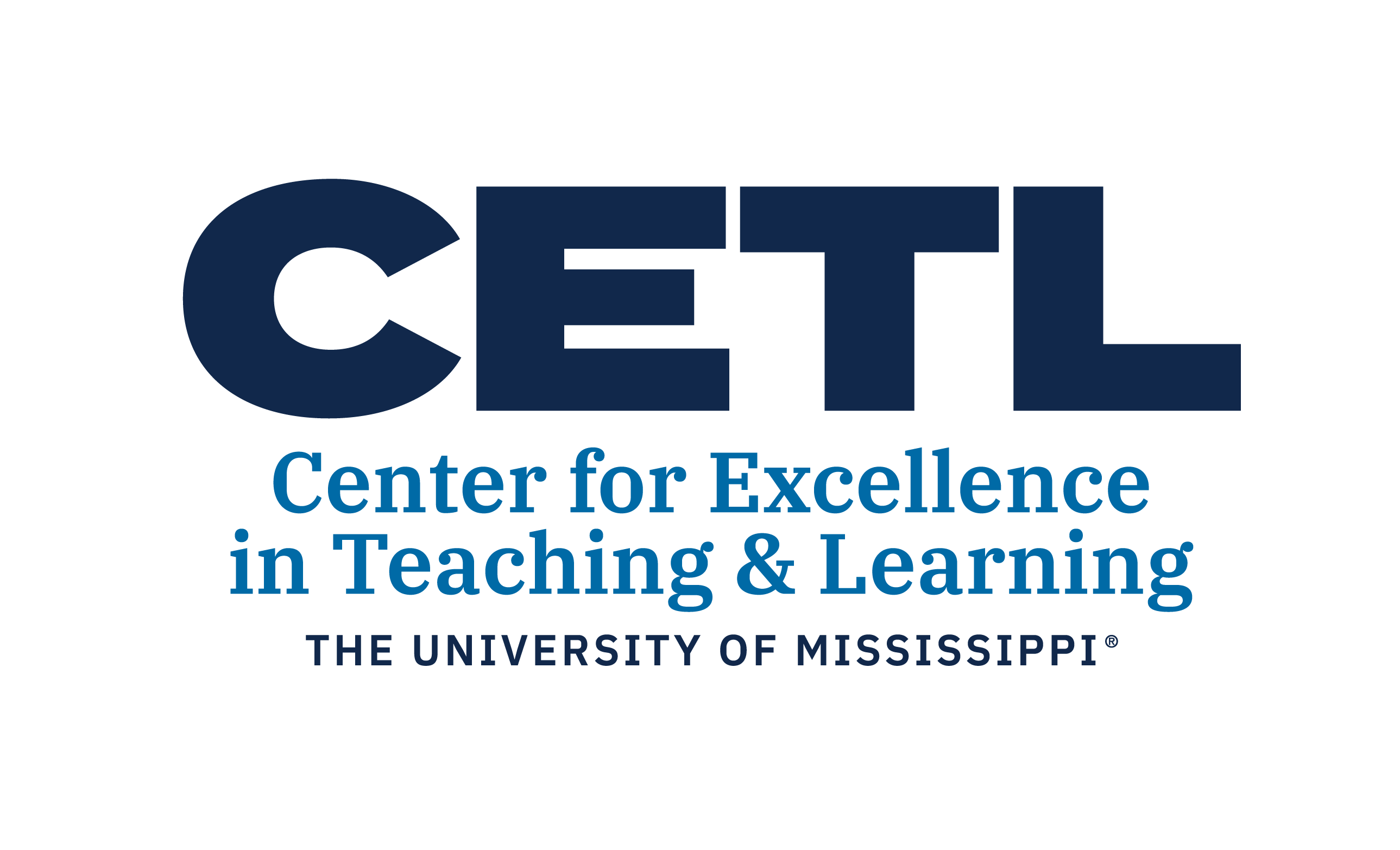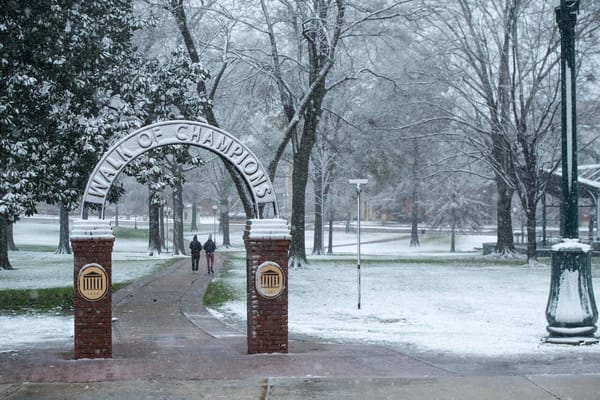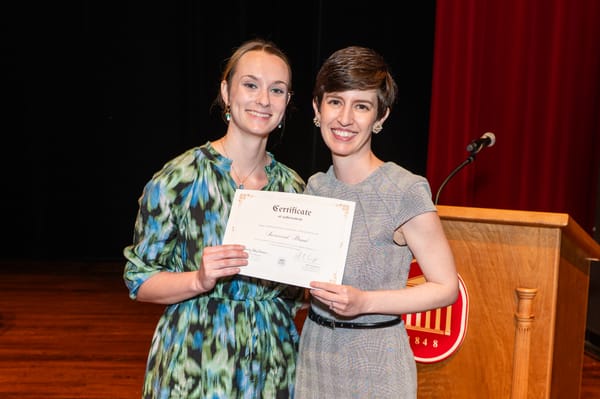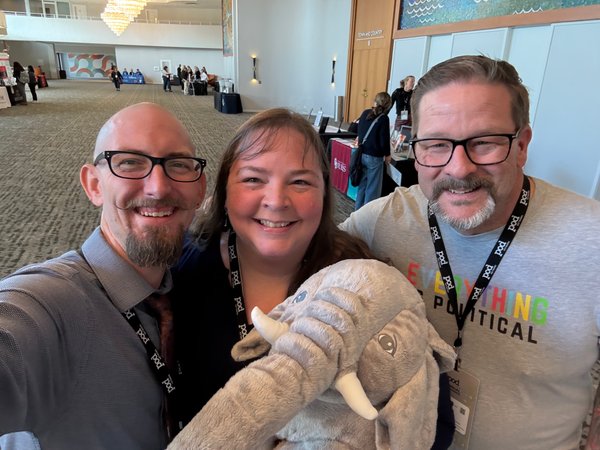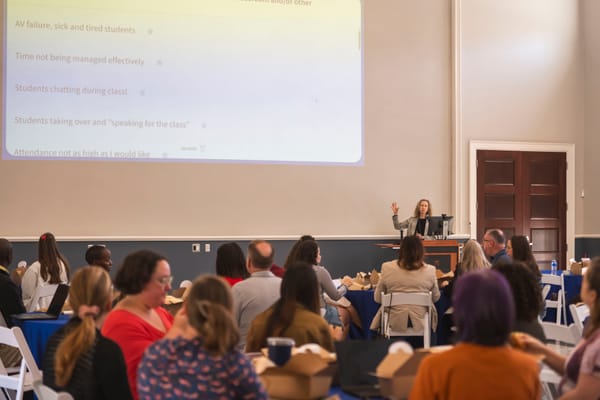Announcing CETL’s Fall 2025 Lineup
Teaching large courses, navigating generative AI, real talk about teaching, and more

Welcome back! We at CETL are excited to begin another academic year here at the University of Mississippi, and we look forward to supporting all members of the teaching community during the upcoming semester.
We know that UM instructors are committed to creating meaningful learning experiences for students and that they do incredible work in their classrooms every day. Last year, we had the chance to observe many engaging class sessions, speak with instructors who were employing innovative pedagogical methods, and work with departments on a variety of exciting teaching initiatives.
But we also know that this work is difficult and tiring. We face ongoing challenges with instructor burnout and student mental health. Generative AI has considerably complicated the teaching landscape. And this is a fraught political moment for higher ed, in Mississippi and beyond.
We’ve done our very best to listen to these concerns, and others, from members of our community, and we hope our fall programming can address some of them. While we can’t solve many of the crises we face, we can provide some tools to make your teaching experience more meaningful—and some space to connect with colleagues in a supportive environment.
Welcome Week, August 18-22
We’ll open the semester with a series of Welcome Week workshops for instructors at all levels, particularly our new faculty. We’ll share demographic information about UM students, provide inspirational ideas for introducing your syllabus, and review some important recent findings from the National Academies’ 2025 Report on STEM Education.
We’ll also facilitate two Orientation sessions: one for graduate TAs and instructors and one for faculty members whose classes are part of UM’s Supplemental Instruction program. If you’re in one of those two groups, check your inbox for more information.
Learn more about our Welcome Week offerings in last week’s post.
Fall Workshops
Going into the fall, many instructors have questions about academic freedom and how current events may affect their teaching. So to kick off the semester, CETL director Josh Eyler will facilitate a session on “Teaching in the Current Moment: Academic Freedom and the Classroom.” In this community conversation, we’ll discuss statements (included in the Provost’s recent guidance on HB 1193) that define the concept of academic freedom and its application to our classrooms.
We’ve also heard from many instructors who are seeking support around teaching classes with 50, 100, or 200+ students. (In fact, we get a lot of questions about this in our workshops…) This fall, we’ll facilitate two sessions designed specifically for these instructors. Our Large Courses 101 series will begin with a September session on Active Learning and end with an October session on Building Community. Both workshops will be facilitated by CETL associate director Emily Pitts Donahoe, with support from Graduate Teaching Fellows Amitesh Singh and Brian Wesley Harrington.
In addition to considering instructor challenges, we’re thinking a lot about the challenges our students face these days. One that’s received some recent media attention is reading. Last spring, our guest speaker Dr. Elizabeth Barre shared strategies for “Motivating Students to Embrace the Desirable Difficulties of Reading.” This fall, we’ll continue the conversation with a session designed to answer the question, “When and Why Do Students Read for Class?” In this workshop, CETL associate director Liz Norell will share survey data and focus group findings from a spring 2025 research project on the reading habits of UM students. We’ll then share strategies on how to make the goals of course readings more transparent and meaningful, with plenty of time for Q&A.
Liz will also facilitate a session on another ongoing challenge: student mental health. In “Understanding Mental Health from a Learning Perspective,” she’ll discuss how mental health impacts our students’ abilities to engage in our classes and absorb class material and readings. Further, we’ll share some things instructors can do to improve learning for students with mental health conditions—without requiring them to become therapists and coaches.
Finally, we’re thrilled to welcome a faculty guest speaker to share an exciting teaching approach that’s seen success in her classroom. In November, Dr. Jaqueline Dibiasie-Sammons, Associate Professor of Classics, will lead a workshop on “Engaging Students through Reacting to the Past: Active Learning in the College Classroom.” Reacting to the Past (RTTP) is an immersive, role-playing pedagogy in which students debate, scheme, strategize, and lead their way through pivotal moments in history. Dr. DiBiasie-Sammons’s session will cover the fundamentals of Reacting to the Past and share survey data on its self-reported effectiveness in her own classes.
Real Talk about Teaching, with Jessamyn Neuhaus
One of our aims at CETL is to always be honest about what teaching is really like, with all its successes and struggles. That’s why we’re excited about this fall’s guest speaker, Dr. Jessamyn Neuhaus, Director of the Center for Teaching and Learning Excellence and Professor of Education at Syracuse University. All of us at CETL are big fans of Dr. Neuhaus’s work (especially her new book), and we expect her session to be just as good.
In “Real Talk about Teaching: Normalizing Educators’ Setbacks, Struggles, and Snafus,” Dr. Neuhaus will dismantle the myth of the “super professor” and the notion, appearing in both scholarly and popular discourse alike, that teaching is a perfectible activity. She argues that struggles and setbacks are normal in teaching, and that there’s an urgent need to normalize them for ourselves. Building and strengthening our pedagogical communities of practice, she suggests, is a good way to start.
Navigating Generative AI
We’ll also continue to provide support for faculty who are making difficult decisions about how to handle generative AI in their classrooms this fall. Specifically, our Faculty Reading Group will tackle the book The Opposite of Cheating: Teaching for Integrity in the Age of AI.
In this book, Tricia Bertram Gallant and David A. Rettinger propose a new approach to academic integrity—one that’s in line with the realities of twenty-first century schooling. The book is deeply grounded in research on academic integrity and full of practical suggestions that can help instructors reduce cheating and enhance learning for their students.
CETL is also teaming up with our colleagues in the Academic Innovations Group (AIG) to support a new AI Guides program for faculty. As part of this program, six faculty members will receive a stipend to become a 2025-26 “AI Guide” for their department. The AI Guides will offer informal consultations and support to their departmental colleagues, in addition to designing more formal learning opportunities that can help instructors navigate generative AI in their classrooms.
For more on AI in teaching and learning, check out AIG’s upcoming events.
Support for Graduate TAs and Instructors
Last but certainly not least: we’ll continue to provide support for graduate students in any teaching role, from tutor or TA to instructor of record.
In addition to our annual Graduate Teaching Orientation, we’ll also facilitate Fundamentals of Teaching, a fall learning community for graduate students who are interested in honing their teaching skills. We’ll discuss topics like building community, facilitating active learning, grading student work, and more. This year, the Fundamentals community will meet on selected Mondays from 2:00-3:00.
We’ll also sponsor a Graduate Reading Group, which will tackle the book Teaching Matters: A Guide for Graduate Students.
This is one of the only guides to teaching in higher ed written with grad students in mind. It provides a concise and helpful introduction to inclusive and effective teaching for TAs and instructors in any discipline. The Reading Group meets on selected Fridays at noon. Come for the free book; stay for the free lunch.
All CETL’s graduate programming this year will be supported by three Graduate Teaching Fellows: Brian Wesley Harrington, Sarah Ligon, and Amitesh Singh. (Be on the lookout for a future post introducing our fellows!)
If you’re a graduate student interested in either of these programs, be sure to register by September 1. And check out our Graduate Teaching Credential program to get credit for your teaching-related professional development.
___
In addition to the programming above, we’ll continue to offer services to individual instructors, like teaching consultations, classroom observations, and student feedback sessions. CETL liaisons will also continue to work with individual departments on any teaching and learning initiatives for which they might want support.
We hope that no matter who you are, what you teach, or where you’re at in your teaching journey, you’ll find something in CETL’s fall lineup that can help make your work a little easier. If you’re a member of the UM community, you can view our full events calendar, and register to attend, on our website.
